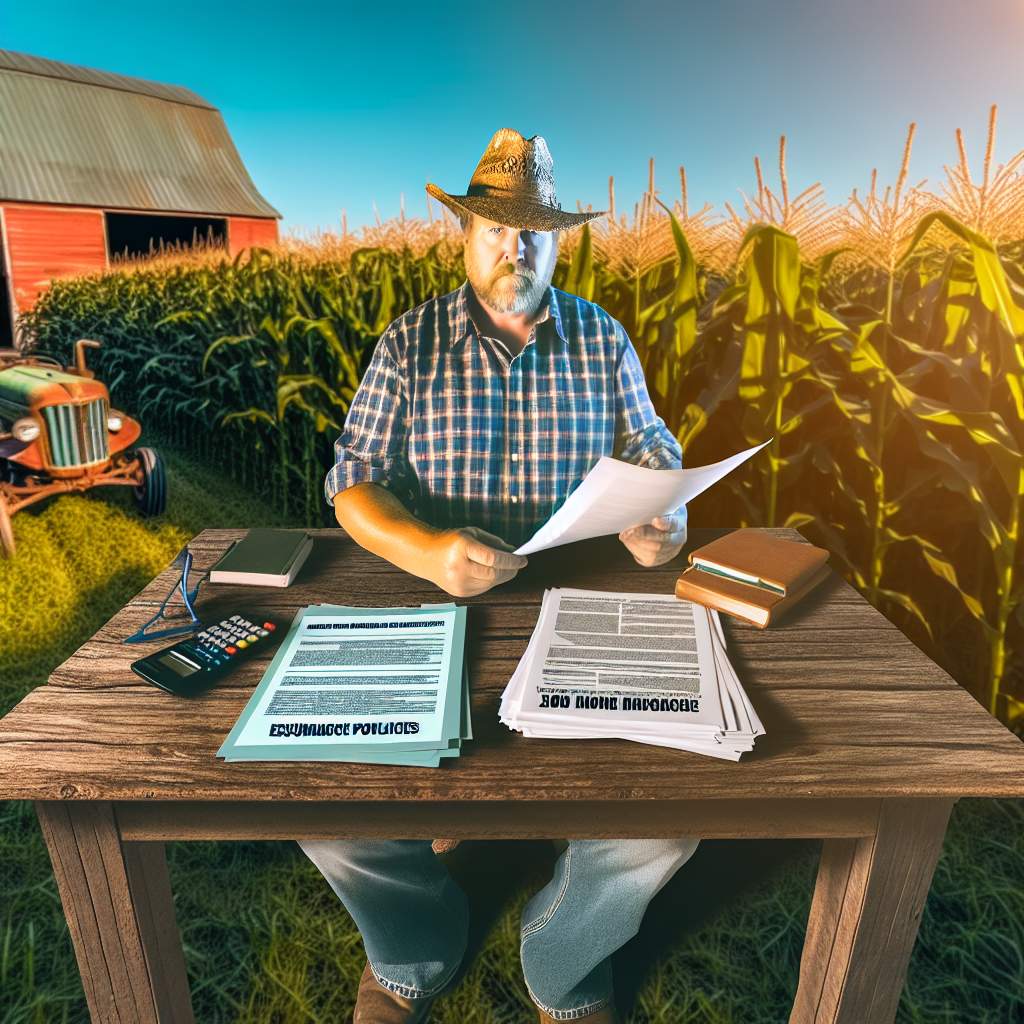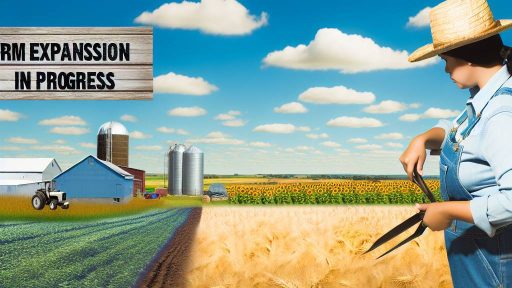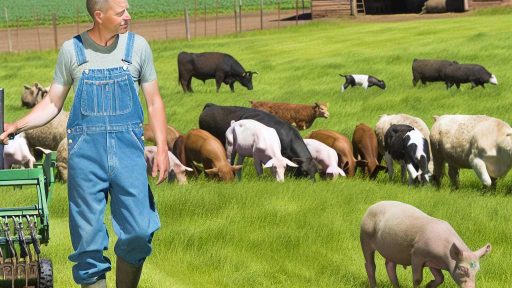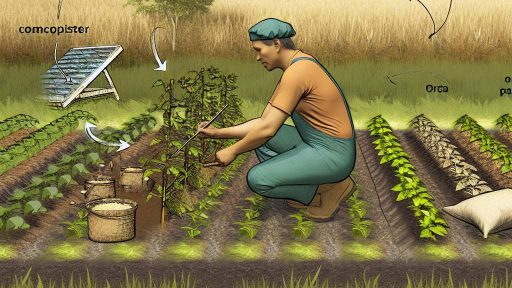Introduction to Insurance for Farmers: Why It’s Essential
Insurance plays a key role in modern farming.
Farmers face many risks daily, from unpredictable weather to market fluctuations.
These uncertainties can severely impact their livelihoods.
Insurance provides a financial safety net for farmers during tough times.
Ultimately, it secures their investments and sustains agricultural businesses.
Understanding the Risks
Farmers encounter various risks that can threaten their operations.
Weather-related events, such as droughts and floods, pose significant challenges.
Additionally, pests and diseases can devastate crops and livestock.
Price volatility in commodities can also lead to financial instability.
Insurance helps mitigate these risks by offering protection against losses.
The Importance of Financial Security
Financial security is vital for farmers to thrive and grow.
Insurance ensures they can recover from unexpected setbacks.
Having a safety net enables farmers to invest in new technologies and practices.
Moreover, it promotes stability in the agricultural sector.
This stability benefits not only farmers but also consumers and communities.
Transform Your Agribusiness
Unlock your farm's potential with expert advice tailored to your needs. Get actionable steps that drive real results.
Get StartedAccessing Insurance Options
Modern farmers have access to various insurance products tailored to their needs.
Crop insurance protects against yield losses resulting from adverse conditions.
Livestock insurance safeguards against the loss of animals due to disease or accidents.
Liability insurance shields farmers from claims arising from farm operations.
Finding the right coverage is essential for long-term success.
Types of Insurance Policies Relevant to Modern Farmers
Crop Insurance
Crop insurance protects farmers from losses due to natural disasters.
It covers events like droughts, floods, and hail damage.
This policy is essential for maintaining financial stability.
Many farmers choose federal crop insurance programs.
These programs often offer subsidized premiums for coverage.
Livestock Insurance
Livestock insurance safeguards against losses from disease and accidents.
It includes policies for cattle, sheep, and poultry.
This coverage helps farmers recover from unexpected events.
Farmers often implement risk management strategies.
These strategies can reduce their exposure to potential losses.
Equipment and Machinery Insurance
Equipment and machinery insurance covers damage to farming equipment.
This includes tractors, harvesters, and irrigation systems.
Farmers rely heavily on their machinery for productivity.
Coverage can be customized based on individual needs.
It protects against theft, accidents, and mechanical failures.
General Liability Insurance
General liability insurance protects farmers from third-party claims.
This includes injuries to visitors or damages caused by farming operations.
Such policies are vital for farm safety and risk management.
They can cover legal fees and settlements as needed.
Showcase Your Farming Business
Publish your professional farming services profile on our blog for a one-time fee of $200 and reach a dedicated audience of farmers and agribusiness owners.
Publish Your ProfileFarmers must understand their liability exposure.
Farm Property Insurance
Farm property insurance covers buildings and structures on the farm.
It protects against risks like fire, storm, and vandalism.
This policy helps farmers safeguard their investments.
Coverage can extend to barns, silos, and warehouses.
Regular property assessments ensure adequate coverage limits.
Business Interruption Insurance
Business interruption insurance provides coverage for lost income.
This occurs during periods when the farm is unable to operate.
It can result from disasters that damage property or equipment.
This policy helps maintain cash flow during recovery efforts.
Farmers should evaluate their income risks and needs.
Environmental Liability Insurance
Environmental liability insurance addresses pollution-related incidents.
This applies if a farm unintentionally harms local ecosystems.
Coverage can include cleanup costs and legal fees.
Farmers face increasing regulatory scrutiny regarding environmental practices.
This insurance protects their interests and ensures compliance.
Crop Insurance: Protecting Against Natural Disasters
Importance of Crop Insurance
Crop insurance serves as a safety net for farmers.
It protects against losses due to natural disasters.
This protection allows farmers to manage risks effectively.
Consequently, farmers can secure their livelihoods.
Types of Crop Insurance
Several types of crop insurance exist for farmers.
These include actual production history policies.
They also consist of revenue protection insurance.
Moreover, farmers can choose multiple peril crop insurance.
How Crop Insurance Works
Crop insurance functions by providing financial compensation.
This compensation occurs after verified production losses.
Farmers pay premiums for these insurance policies.
In return, they receive coverage for covered losses.
Eligibility and Application Process
Eligibility requirements vary by insurance type.
Farmers must demonstrate insurable interest in their crops.
To apply, farmers typically fill out a standard application form.
Submitting necessary documents helps speed up the process.
Benefits of Crop Insurance
Crop insurance offers numerous benefits to farmers.
Farmers gain peace of mind knowing they are protected.
Additionally, it enables farmers to secure loans more easily.
This financial stability promotes agricultural investment.
Choosing the Right Policy
Selecting the right crop insurance policy is crucial.
Farmers should assess their specific needs and risks.
Comparing policies enhances informed decision-making.
Working with an experienced agent can provide valuable insights.
Showcase Your Farming Business
Publish your professional farming services profile on our blog for a one-time fee of $200 and reach a dedicated audience of farmers and agribusiness owners.
Publish Your ProfileDiscover More: Financial Planning for Successful Diversified Agribusinesses
Livestock Insurance: Safeguarding Your Animals
Importance of Livestock Insurance
Livestock are valuable assets on any farm.
Firstly, livestock insurance protects against unexpected losses.
Secondly, it provides peace of mind for farmers.
Additionally, it ensures financial stability during tough times.
Moreover, insurance can cover various scenarios.
Types of Livestock Insurance
Various types of livestock insurance exist to fit different needs.
For instance, mortality insurance covers the death of animals.
It typically protects against disease, accidents, and theft.
Health insurance can cover veterinary expenses.
Furthermore, production insurance guarantees income from livestock sales.
Choosing the Right Policy
Selecting the right policy involves careful consideration.
Firstly, assess the specific needs of your livestock.
Then, evaluate potential risks relevant to your farm.
Next, compare various insurance providers.
It’s also essential to read policy terms and conditions thoroughly.
Cost Considerations
Costs vary depending on the type of coverage chosen.
Higher coverage limits typically mean higher premiums.
However, investing in insurance can save money in the long run.
Evaluate your budget to find suitable options.
Steps to Take After a Loss
After experiencing a loss, notify your insurance provider promptly.
Gather necessary documentation to support your claim.
Keep detailed records of your livestock and their health.
Furthermore, expect a representative to assess the situation.
This process often leads to compensation based on your policy.
See Related Content: Labor Management Strategies For Cost-Effective Farming
Farm Equipment Insurance: Coverage for Machinery and Tools
Importance of Farm Equipment Insurance
Farm equipment insurance protects vital machinery and tools.
Consequently, farmers minimize financial risks associated with equipment loss.
This coverage is essential for maintaining operational continuity.
Farmers can focus on their work without worrying about equipment damage.
Types of Coverage Offered
Farm equipment insurance generally includes several coverage types.
- Theft coverage protects against the loss of equipment.
- Damage coverage applies to breakdowns and accidents.
- Liability coverage handles injuries caused by equipment.
Choosing the Right Policy
Selecting an appropriate farm equipment policy is crucial.
Farmers should evaluate their specific machinery needs.
Consider the value of equipment and the potential risks involved.
Consulting with insurance professionals may provide valuable insights.
Factors Affecting Insurance Costs
Several factors influence the cost of farm equipment insurance.
- The type and value of equipment impact premiums.
- Previous claims history can lead to higher rates.
- Geographic location affects the likelihood of theft or damage.
Understanding these factors helps farmers make informed decisions.
Maintaining Your Equipment
Regular maintenance reduces the likelihood of equipment failure.
Farmers should perform routine checks and repairs as needed.
Additionally, proper storage protects equipment from theft and damage.
Showcase Your Farming Business
Publish your professional farming services profile on our blog for a one-time fee of $200 and reach a dedicated audience of farmers and agribusiness owners.
Publish Your ProfileCaring for machinery prolongs its lifespan and efficiency.
Delve into the Subject: Organic Fertilizer Use To Decrease Production Costs
Liability Insurance: Protecting Against Legal Risks
Understanding Liability Insurance
Liability insurance protects farmers from various legal risks.
It covers legal fees and damages related to lawsuits.
Many farmers face potential claims due to accidents or injuries.
Liability insurance provides peace of mind in uncertain situations.
Types of Liability Insurance
Farmers can choose from several types of liability insurance.
- General liability insurance covers bodily injury and property damage.
- Product liability insurance protects against claims related to farm products.
- Pollution liability insurance addresses environmental damage claims.
Each type plays a vital role in risk management.
Benefits of Liability Insurance
Having liability insurance ensures financial security for farmers.
It allows farmers to focus on operations without fear of large claims.
Additionally, it can enhance a farm’s credibility with clients and partners.
Moreover, it can be a requirement for certain contracts and agreements.
How to Choose the Right Policy
Selecting the right liability insurance policy is crucial.
First, assess specific risks associated with your farm operations.
Next, compare policies from reputable insurance providers.
It is essential to read the fine print and understand exclusions.
Consulting with an insurance agent can provide valuable insights.
Discover More: Crop Rotation Techniques for Sustainable Diversification

Revenue Protection: Ensuring Financial Stability
Understanding Revenue Protection
Revenue protection insurance supports farmers in times of economic uncertainty.
This policy safeguards income against losses from various risks.
It covers losses due to natural disasters and fluctuating market prices.
Farmers can secure their investments through comprehensive revenue protection plans.
Benefits of Revenue Protection Insurance
This type of insurance provides crucial financial security for modern farmers.
It helps manage the risks inherent in agricultural production.
Farmers can focus on crop management instead of financial distress.
Additionally, it promotes long-term financial planning and stability.
- Ensures consistent cash flow during difficult times.
- Reduces stress related to market fluctuations.
- Encourages reinvestment into farming operations.
How to Choose a Revenue Protection Plan
Selecting the right insurance requires careful consideration.
Farmers should assess their specific agricultural needs and risks.
It’s wise to consult with experienced insurance agents.
They can offer targeted advice for individual circumstances.
- Understand the types of coverage available.
- Consider premium costs versus potential payouts.
- Review past performance and future projections for crops.
Implementing Revenue Protection
Successfully implementing revenue protection starts with proper documentation.
Farmers must maintain meticulous records of crop yields and sales.
Regularly updating this information minimizes claim processing delays.
Furthermore, staying informed about policy changes ensures compliance.
Ultimately, proactive management of these practices enhances protection.
Risk Management Strategies for Farmers
Identifying Common Risks
Farmers face various risks that can impact their operations.
Weather events, such as droughts or floods, pose significant threats.
Pest infestations can lead to devastating crop losses.
Market fluctuations often create uncertainty in revenue.
Additionally, changes in regulations can affect farming practices.
Showcase Your Farming Business
Publish your professional farming services profile on our blog for a one-time fee of $200 and reach a dedicated audience of farmers and agribusiness owners.
Publish Your ProfileImplementing Insurance Solutions
Insurance serves as a crucial tool in risk management.
Agricultural insurance offers protection against losses.
Many farmers opt for crop insurance policies to mitigate risk.
Livestock insurance protects against unforeseen animal losses.
Furthermore, liability insurance safeguards against legal claims.
Diversification of Crops and Income
Diversification reduces the overall risk exposure for farmers.
By planting multiple crops, farmers can hedge against losses.
They may also explore additional income streams like agritourism.
Investing in vertical farming or organic produce can be profitable.
Ultimately, a diverse business model enhances farm resilience.
Utilizing Technology and Resources
Technological advancements aid farmers in managing risks effectively.
Precision agriculture optimizes resources and minimizes waste.
Data analytics provides insights into market trends and weather forecasts.
Farm management software helps track expenses and yields.
By leveraging these tools, farmers make informed decisions.
Building Strong Community Networks
Community support enhances resilience among farmers.
Joining agricultural cooperatives fosters shared resources.
Networking with other farmers provides valuable insights.
Additionally, engaging with local agricultural extension services benefits farmers.
Strong relationships within communities create a safety net during crises.
How to Choose the Right Insurance Policies for Your Farm
Assessing Your Farm’s Unique Needs
Start by evaluating your farm’s operations and risks.
Consider factors such as crop type, livestock, and location.
This assessment helps identify specific coverage requirements.
Moreover, be mindful of seasonal risks that may arise.
Understanding Different Types of Insurance
Familiarize yourself with the available insurance types.
Crops insurance protects against lost yields due to unforeseen events.
Liability insurance covers accidents on your property.
Finally, property insurance insures your buildings and equipment.
Evaluating Insurance Providers
Research reputable insurance companies in your area.
Look for providers that specialize in agricultural insurance.
Read customer reviews and testimonials to gauge satisfaction.
Additionally, compare quotes to find the best coverage and rates.
Consulting with Insurance Agents
Engaging an experienced insurance agent can be beneficial.
They can explain complex policy details and options clearly.
An agent can also tailor coverage to fit your farm’s needs.
Furthermore, they provide insights into potential discounts.
Regularly Reviewing Your Policies
Ensure you review your insurance policies annually.
Changes in operations may necessitate policy adjustments.
Keep up with new regulations or programs that could impact coverage.
This proactive approach keeps your protection comprehensive and up-to-date.
Showcase Your Farming Business
Publish your professional farming services profile on our blog for a one-time fee of $200 and reach a dedicated audience of farmers and agribusiness owners.
Publish Your ProfileAdditional Resources
Increased Food Security and Self Sufficiency Strategy




